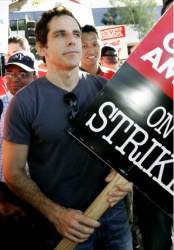Hollywood – Lo sciopero degli sceneggiatori da un altro punto di vista
Tutti uniti nello sciopero della WGA. O meglio, quasi tutti, come sempre accade. Nonostante il sottoscritto abbia bollato come retorica da quattro soldi la sortita di Arnold Schwarzenegger – solita dialettica del potere forte che dipinge lo sciopero come un’arma contro i deboli -, è necessario analizzare la situazione anche da altri punti di vista.Per

 Tutti uniti nello sciopero della WGA. O meglio, quasi tutti, come sempre accade.
Tutti uniti nello sciopero della WGA. O meglio, quasi tutti, come sempre accade.
Nonostante il sottoscritto abbia bollato come retorica da quattro soldi la sortita di Arnold Schwarzenegger – solita dialettica del potere forte che dipinge lo sciopero come un’arma contro i deboli -, è necessario analizzare la situazione anche da altri punti di vista.
Per esempio, dal punto di vista di tutti coloro che lavorano negli show a rischio e che non fanno parte di un’organizzazione potente come la WGA.
L’estratto che segue proviene da una mail di Dale Alexander, che lavora come macchinista nella serie The Office, attualmente chiusa in seguito al protrarsi dello sciopero. La mail è stata pubblicata dal L.A. Times Blog.
Our show was shut down and we were all laid off this week. I’ve been watching the news since the WGA strike was announced and I have yet to see any coverage dedicated to the effect that this strike will have on the below the line employees.
“I respect the WGA’s position. They probably do deserve a larger percentage of profit participation, but a lengthy strike will affect more than just the writers and studios. On my show we had 14 writers. There were also 2 cameramen, 2 camera assistants, 4 hair stylists, 4 makeup artists, 7 wardrobe people, 4 grips, 4 electricians, 2 craft service, 4 props people, 6 construction, 1 medic, 3 art department, 5 set dressers, 3 sound men, 3 stand-ins, 2 set PAs, 4 assistant directors, 1 DGA trainee, 1 unit manager, 6 production office personnel, 3 casting people, 4 writers assistants, 1 script supervisor, 2 editors, 2 editors assistants, 3 post production personnel, 1 facilities manager, 8 drivers, 2 location managers, 3 accountants, 4 caterers and a producer who’s not a writer. All 102 of us are now out of work.
Perlopiù, la posizione di Dare è comprensibilissima, ma per i non anglofoni facciamone un sunto: la macchinista elenca i 102 lavoratori-non-sceneggiatori che, fino a ieri, erano impegnati nella produzione di The Office. 102 persone che attualmente si trovano senza lavoro.
Ma vediamo il seguito della mail:
“I have been in the motion picture business for 33 years and have survived three major strikes. None of which have been by any of the below the line unions. During the 1988 WGA strike many of my friends lost their homes, cars and even spouses. Many actors are publicly backing the writers, some have even said that they would find a way to help pay bills for the striking writers. When the networks run out of new shows and they air repeats the writers will be paid residuals. The lowest paid writer in television makes roughly twice the salary than the below the line crewmember makes. Everyone should be paid their fair share, but does it have to be at the expense of the other 90% of the crewmembers. Nobody ever recoups from a strike, lost wages are just that, lost.
“We all know that the strike will be resolved. Eventually both sides will return to the bargaining table and make a deal. The only uncertainty is how many of our houses, livelihoods, college educations and retirement funds will pay for it.”
Chiaro, no? Dare non è certo contrario allo sciopero, anzi. Ma sottolinea come, in 33 anni, i tre strikes più importanti non siano mai stati sostenuti da organizzazioni di livelli più bassi. Durante l’ultimo grande sciopero della WGA molti hanno perso la casa, le proprietà, e fra cameraman, elettricisti, macchinisti e via dicendo non c’è nessuno che percepisca compensi in caso di messa in onda delle repliche. Agli sceneggiatori capita.







